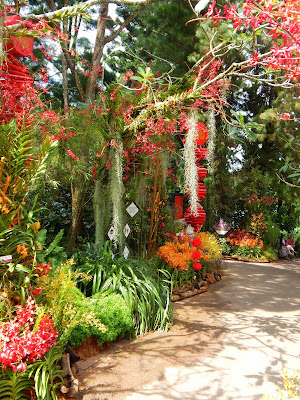One of the most enjoyable aspects of this Semester at Sea experience is that we typically have opportunities to interact closely with some of the people in the countries we visit. One thing that is easy to see from our vantage points is that many of the folks in Asia realize that learning English is an avenue for a better life. As teachers. As tour guides. Working for international businesses. And on and on. Our travels to Japan, China, Vietnam, Singapore and Myanmar (Burma) have been relatively easy in terms of communication, even in rural areas, with respect to language since most people seem to know some English.
 |
| Singapore Botanical Gardens |
I’ve heard, and you probably have too, that English and Mandarin are quickly becoming the international languages. We’ve all noticed a lot of anti-Chinese sentiments during our travels in Asia (even in China!), and a real desire to speak English to anyone who will speak it back, especially in the rural areas of Vietnam and Myanmar (where they are strongly anti-Chinese because
 |
| Singapore skyline |
the former military government struck many sweetheart deals with China that left out most Burmese citizens).
Since leaving Vietnam we spent 2 days in Singapore, and a week in Myanmar. I dare you to find 2 more different countries. Singapore is tiny and has essentially no resources, yet has the greatest number of millionaires per capita and the longest life-expectancy of any country on Earth. It’s also very clean, with some of the most advanced infrastructure found anywhere. However, Singapore residents rate VERY LOW on most happiness scales. I saw more Louis Vitton and Rolex stores than I did smiling people. If I never go back to Singapore, I won’t feel too disappointed. I feel bad about dissing it because there are some things that are really impressive (I will post some photos tomorrow) such as the architecture and the botanical gardents, but it was overly western and completely lacked the charm we experienced in Vietnam. Overall? Meh.
 |
| Solar trees in Singapore |
Myanmar, on the other hand, has enormous natural riches (gold, silver, oil, teak, ruby and other precious gems), but because it had one of the most corrupt governments on Earth until 2012, the people are very poor, and the country has such a poor infrastructure that they can’t attract foreign investors (even though it has the two post populated countries on Earth for neighbors). However, I will be bummed if I don’t get back to Myanmar. An amazing place with lots of smiles and hospitality (and great food!).
So, I’ve had the opportunity to spend some time working on English-speaking with a group of prospective English teachers from Nha Trang College, and a couple of hours at a monastery in Myanmar conversing with an English class attended by many from the community, including a couple dozen monks. It’s actually a very draining (constantly trying to come up with questions that allow them to answer with their level of English) but really fun mostly because of their humor and enthusiasm, which I’m sure comes through in the photos.
 |
| Sitting with Nha Trang University students. |
My conversations with a group of 20-something monks drifted towards politics, poverty and natural resources. I commented on how Singapore had so much affluence despite lacking most things a country needs to be prosperous, and how things were totally turned around in Myanmar, all because of leadership. One monk agreed that was true, but added the most important aspect of society – “but we are happy and they are not”. Touche’ good friend.
 |
| My group of English students in Mandalay, Myanmar |
I hope Myanmar can develop so that people there don’t have to toil so hard to make a living. In doing so I also hope they can keep hold of the parts of their culture that uplift them and keep out the aspects that make an affluent country like Singapore become Singapoor when measured by happiness.





No comments:
Post a Comment